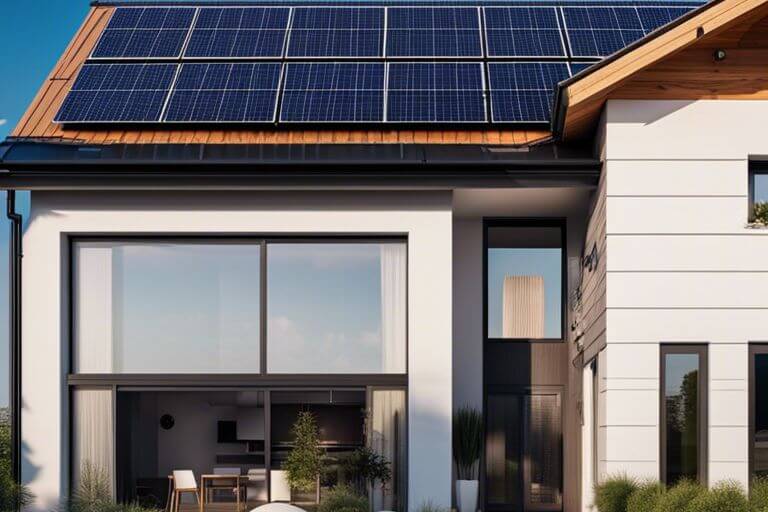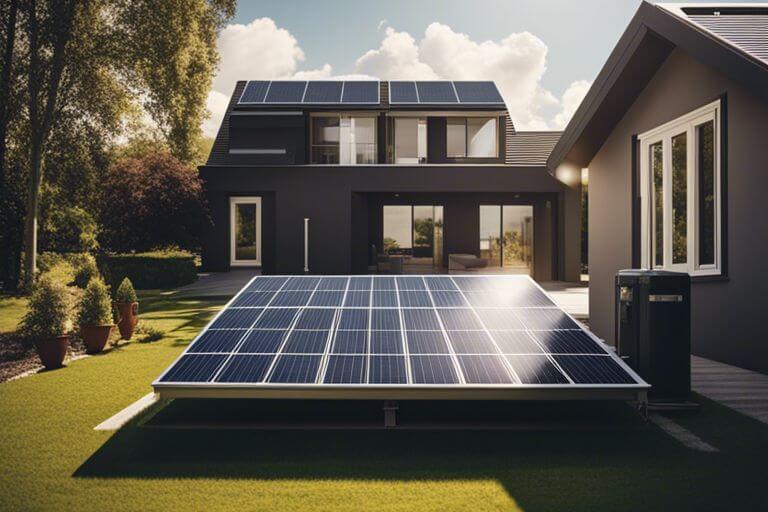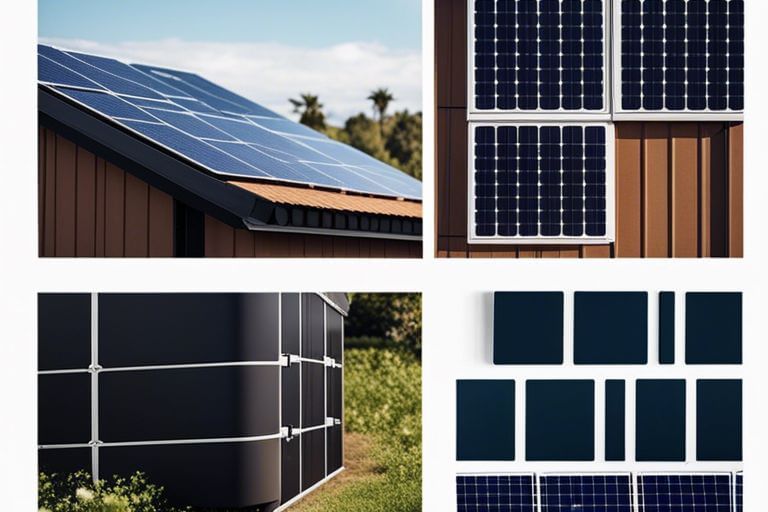Solar energy is a clean, renewable source of power that can help you save on electricity bills while reducing your carbon footprint. If you’re considering harnessing the power of the sun by setting up a solar generator for your home, you’re on the right track. In this guide, we’ll walk you through the steps of how you can hook up a solar generator to your house, so you can start enjoying the benefits of solar energy in no time.
Key Takeaways:
- Solar generators can be connected to your house: Solar generators can be used to power devices in your home and can be physically connected to your house’s electrical system.
- Consult a professional: It is important to consult a professional electrician or solar energy expert before attempting to connect a solar generator to your house to ensure safety and compliance with local regulations.
- Consider backup options: While connecting a solar generator to your house can be beneficial for reducing electricity costs and environmental impact, it is advisable to have backup power sources in case of emergencies or when the solar generator doesn’t provide sufficient power.

Benefits of Hooking up a Solar Generator to Your House
Reduced Energy Bills
With a solar generator connected to your house, you can significantly reduce your energy bills. By harnessing the power of the sun to generate electricity, you can rely less on traditional utility companies, ultimately leading to savings on your monthly energy expenses. Additionally, some regions offer incentives or credits for homeowners who produce their own solar energy, further decreasing costs.
Environmental Benefits
Benefits
House
Increased Energy Independence
Environmental
Bills
Types of Solar Generators
The topic of solar generators can be broken down into three main types: Grid-Tie Systems, Off-Grid Systems, and Hybrid Systems. Each type has its own unique characteristics and applications when it comes to powering your house. To learn more about how a solar generator can power your home, check out this related article: Can a Solar Generator Power a House? [Expert Answer].
Grid-Tie Systems
| Generators | Grid-Tie Systems |
| Pros | – Lower cost – Easy installation |
| Cons | – Reliant on the grid – No backup power during outages |
| Usage | Best for areas with stable grid connection |
| Recommendation | Consider adding a battery storage system for backup power |
Recognizing the pros and cons of Grid-Tie Systems can help you determine if this type of solar generator is suitable for your house.
Off-Grid Systems
| Any | Off-Grid Systems |
| Pros | – Complete independence – Backup power during outages |
| Cons | – Higher cost – More complex installation |
| Usage | Ideal for remote locations without access to the grid |
| Recommendation | Ensure you have enough battery storage for continuous power supply |
A fully self-sustaining Off-Grid System is a great choice if you want to live off the grid and rely solely on solar power for your house.
Hybrid Systems
| GridTie | Hybrid Systems |
| Pros | – Combines benefits of Grid-Tie and Off-Grid Systems – Provides backup power |
| Cons | – Higher initial cost – Requires maintenance of both grid-tied and off-grid components |
| Usage | Best for areas with unreliable grid connection |
| Recommendation | Ensure proper balance between grid-tied and off-grid components for efficiency |
To get the best of both worlds in terms of reliability and independence, a Hybrid System is a suitable choice for powering your house with solar energy.

Preparing Your House for Solar Power
Assessing Your Energy Needs
To ensure your solar generator setup meets your household’s energy requirements, begin by evaluating your average daily electricity consumption. Take into account your appliances, lighting, electronics, and heating/cooling systems. Knowing your energy needs will help determine the size and capacity of the solar generator required to power your home.
Checking Local Building Codes and Regulations
Before installing a solar generator, you must check with your local building department to review regulations and obtain any necessary permits. These codes ensure that the installation meets safety standards and grid interconnection requirements. Non-compliance could lead to fines or even the shutdown of your solar system.
Local building codes for solar installations typically cover aspects such as structural integrity, distance from edges of the roof, and electrical safety. It’s crucial to follow these regulations not only for legality but also for the safety and efficiency of your solar power setup.
Ensuring a Safe Installation
With safety being a top priority, you’ll need to ensure the proper installation of your solar generator. This involves securing the panels correctly, grounding the system as required, and following electrical and building codes. Hiring a professional installer can help guarantee a safe and efficient setup, reducing the risk of accidents or system malfunctions.
Understanding the intricacies of solar power installations and safety measures will empower you to make informed decisions throughout the process. By adhering to best practices and regulations, you can enjoy the benefits of sustainable energy without compromising on safety.
Choosing the Right Solar Generator for Your House
Determining Your Power Requirements
Unlike a traditional generator, a solar generator’s capacity is limited by the size of its battery and the amount of sunlight it receives. To determine the right solar generator for your house, you need to calculate your power requirements accurately.
Selecting the Right Size and Type of Generator
Right size and type of solar generator will depend on your daily power needs and the appliances you want to run. Consider if you need a portable or stationary generator, as well as the size of the battery and the solar panels to meet your energy demands.
Choosing the right size and type of generator involves evaluating the wattage of each appliance in your house and how many hours you will be using them daily. This will help you determine the capacity of the solar generator needed to keep everything running smoothly.
Considering Additional Features and Accessories
Right additional features and accessories can enhance the functionality and convenience of your solar generator. Look for features such as multiple outlets, USB ports, LED lights, and a built-in inverter to meet your specific needs.
With the right additional features and accessories, you can make the most out of your solar generator by charging various devices simultaneously, powering lights during emergencies, and even running small appliances to maintain a comfortable living environment.
Installation and Connection Options
Professional Installation vs. DIY
Any time you are looking to hook up a solar generator to your house, you will need to decide between professional installation and a do-it-yourself approach. While connecting a solar generator to your home may seem straightforward, it involves electrical work that should be done correctly and safely. It’s recommended to consult with a professional electrician or contractor to ensure that the installation meets building codes and regulations. For more detailed information on integrating a backup generator with solar, check out Back-up Generator with Solar.
Connecting to Your Electrical Panel
Options for connecting your solar generator to your electrical panel include a manual transfer switch or an interlock kit. A manual transfer switch allows you to safely switch between grid power and your solar generator power. An interlock kit prevents the generator from feeding back into the grid, ensuring the safety of utility workers during a power outage. It’s crucial to follow all local codes and guidelines when connecting your solar generator to your electrical panel to ensure a safe and efficient setup.
Panel upgrades may be necessary to accommodate the additional power supply from a solar generator. It’s vital to have a professional assess your electrical panel and determine if any upgrades are needed for a successful connection. If you are unsure about how to proceed, consulting with a licensed electrician is highly recommended.
Battery Backup and Storage Options
Connection to battery backup and storage options can enhance the capabilities of your solar generator setup. Adding batteries to store excess energy generated by your solar panels allows you to have power during periods of low sunlight or grid outages. Some solar generators come with built-in battery storage, while others may require separate battery units. Understanding your power needs and how long you may need backup power will help determine the appropriate battery backup and storage options for your setup.
Installation of battery backups and storage options should be done with caution. Follow the manufacturer’s instructions carefully and consider consulting with a professional to ensure correct installation and optimal performance. Proper maintenance and monitoring of the batteries are vital to maximize their lifespan and efficiency in supporting your solar generator system.
Safety Considerations and Maintenance
Electrical Safety Precautions
Not properly handling electrical components can pose serious safety risks when hooking up a solar generator to your house. Always ensure that the generator is turned off before making any connections to your home’s electrical system. It’s crucial to follow the manufacturer’s instructions and seek the help of a qualified electrician if you’re unsure about any step in the process.
Regular Maintenance and Inspection
Safety should be your top priority when it comes to using a solar generator in your home. Regular maintenance and inspection are necessary to ensure that the system operates safely and efficiently. Make it a habit to check for any signs of wear or damage to the components, such as the solar panels, wiring, and batteries.
Regularly cleaning the solar panels to remove dirt and debris will help maintain their efficiency. Additionally, inspecting the wiring for any loose connections or fraying will prevent potential hazards like electrical fires.
Troubleshooting Common Issues
Common issues may arise when using a solar generator in your home, such as reduced power output or battery problems. If you notice any decrease in performance, first check the connections and ensure everything is properly connected. You should also monitor the battery status regularly and replace it if it shows signs of deterioration.
Considerations such as shading on the solar panels or extreme weather conditions can also affect the performance of your solar generator. By addressing these factors promptly, you can ensure that your system continues to function smoothly.
Conclusion
Summing up, it is possible to hook up a solar generator to your house, providing you with a renewable source of energy to power your appliances and devices. However, it is crucial to do thorough research and consult with professionals to ensure that you have the right equipment and set up for your specific needs.
By harnessing the power of the sun through a solar generator, you can reduce your reliance on traditional energy sources and decrease your carbon footprint. Embracing solar energy is a sustainable choice that not only benefits the environment but also can lead to long-term cost savings on your energy bills. So, if you are considering making the switch to solar power, be sure to explore all options available to you and make an informed decision that aligns with your goals and values.
Q: Can you hook up a solar generator to your house?
A: Yes, you can hook up a solar generator to your house to power your electrical appliances and reduce your reliance on the grid.
Q: What are the advantages of connecting a solar generator to your house?
A: The main advantages include lower energy costs, reduced carbon footprint, increased energy independence, and the potential to generate excess energy that can be sold back to the grid.
Q: Do I need special equipment to connect a solar generator to my house?
A: Yes, you will need a power inverter to convert the DC electricity generated by the solar panels into AC electricity that can be used in your home. You may also need a charge controller to regulate the flow of electricity from the solar panels to the battery storage system.
